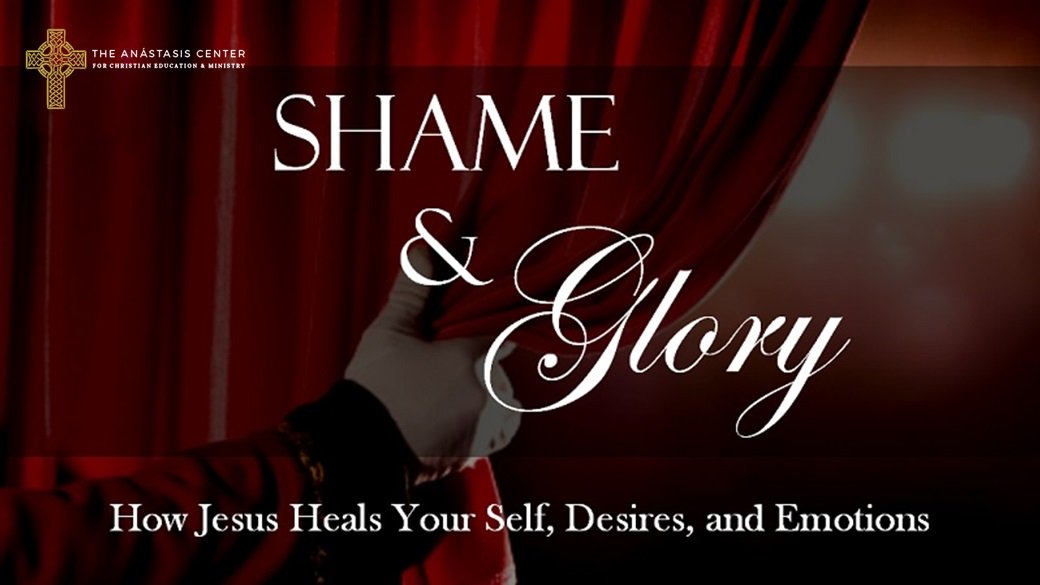Introduction
Shame and Glory is a curriculum for small group discussion or personal reflection. While healthy shame means regret, toxic shame is the desire to hide the self. Either way, glory is the response of God to invest Himself in us and renew His image in us. This material explores humanity as fundamentally good, but corrupted by sin, and not entirely in control of our own desires and emotions. Part of the spiritual and emotional struggle, then, is to know ourselves, know how God sees and loves us, and to receive into ourselves the Spirit of Christ, who renews the image of God in us.
Shame and Glory is peppered with insights from the early Christians, including some “desert fathers and mothers” who were the earliest “spiritual directors.”
The following video clips are from our 2019 Conference: Healing Atonement. Mako Nagasawa discusses the emotional development consequences of using penal substitutionary atonement, and then how Jesus draws our human nature to soak in God. Connie Bahng discusses the importance of Jesus entering into our trauma, and then compares penal vs. medical substitutionary atonement.
Part One: Jesus and Your True Self
1. Your True Self and True Desires, from God's Perspective (Romans 7:14 - 25)
2. That Which is Hidden Will Be Revealed (Luke 12:1 - 3)
3. The Glory of Christ in Us (Colossians 1:27)
4. How Jesus Purifies Human Desires for Us (Matthew 3:13 - 4:11; Romans 8:3 - 4) and Why Is Jesus Good News? evangelism paradigm
5. How Our Choices Shape Our Desires
6. Hell as Misshapen Desire: Hell as the Love of God (and ppts)
Part Two: Letting God's Emotions Shape Your Emotions
This section is also grouped into a curriculum called The Emotions of God.
1. The Longing and Joy of God for the Lost, Part 1 (Luke 15:1 - 10)
2. The Longing and Joy of God for the Lost, Part 2 (Luke 15:11 - 32)
3. The Tears and Anger of God for Humanity (John 11:20 - 44)
4. The Yearning of God (Luke 22:14 - 23)
5. The Gut-Turning Compassion of God (Luke 10:25 - 37; Matthew 9:36; 14:14; 15:32; 20:34)
6. The Eagerness of God to Help Us (Luke 11:1 - 13)
7. The Grieving of God (Ephesians 4:29 - 32)
8. The Jealousy of God (Exodus 20:1 - 6; Deuteronomy 4:1 - 24)
9. The Pleasure of the Father in the Son (Matthew 3:13 - 4:11; John 8:28 - 29)
Part Three: Maturing Emotionally With God
1. Our Empathy (Romans 12:15)
2. Our Anger (Matthew 5:21 - 26; Ephesians 4:26 - 27)
3. Our Sorrow and Guilt vs. Shame (2 Corinthians 7)
4. Our Covetousness vs. Contentment (Philippians 4:4 - 20)
5. Our Fear vs. Jesus' Love (1 John 4:16 - 21; Luke 23:32 - 24:8)
6. Our Joy in Service (Luke 10:17 - 24)
7. Strengthening Your Truest Desires: Developing a Spiritual Rhythm of Life
8. Career Discernment: A Christian Perspective Involving Passions and Desires
9. Career Discernment: Case Studies for Cultivating a Passion for Social Justice
Part Four: Evangelism and Desire
1. Desires, Beliefs, and How We Know Truth
2. Evangelism Through the Lens of Desire: Find Your Heart's Desire? (and instructions)
For More Information
Appendix A: Augustine on the Human Will
Notes on how Augustine saw the human will as so damaged by sin that God had to selectively intervene to make humans want Jesus. This led Luther and Calvin and many Protestants, who elevated those passages from Augustine, to view the human person very negatively.
An article written by Mako Nagasawa for the HonorShame blog, Nov 11, 2015. Shame is the desire to hide the self. It is rooted in a fear that there is nothing good — or nothing left of the image of God — within me, especially in my motivations, desires, and hopes. Thus, penal substitutionary atonement, which only addresses feelings of guilt, still leaves many people feeling shame, which is dangerous and sometimes toxic. Medical substitutionary atonement, by contrast, rests on the view that God is always upholding us in His image, and thus even our sinful desires have an originally good source. For more on this, see Why Penal Substitution Damages Asian-Americans, a presentation contrasting guilt-oriented and shame-oriented persons, and how they tend to interact with two different atonement theories: penal substitution and medical substitution. See also Does God Sound Like an Asian Parent? What Language of Motivation Does He Use? which is a blog post, and a 20 - 30 minute read.
Medical Substitutionary Atonement, Personal Healing, and Social Justice
A presentation given at the Honor-Shame Conference 2017, a gathering of missionaries, scholars, and ministry practitioners, and short Youtube video (4.5 min). This presentation is now a chapter in Honor, Shame, and the Gospel: Reframing Our Message for 21st Century Ministry, William Carey Publishing, 2020. The chapter is called, “How to Empower Personal Healing and Social Justice, with Medical Substitutionary Atonement”.
Beyond "Near" and "Far": Jesus Overcomes Shame and Alienation
Text of a message on Ephesians 2:11 - 22. Paul points out that Jews were “near” and Gentiles were “far” from God, but the critical place and person of importance in Jesus, because Jesus overcame the hostility in human nature against God, others, and self, and wrought peace in his own humanity instead. Thus, being “near” or “far” is irrelevant, because we must now be “in Christ.”
Desire: Jesus Leads Us to True Beauty
The section of our website that focuses more on human desire, and interprets desire from a Jesus-centered perspective.
See other Study and Action Guides produced by The Anástasis Center.
